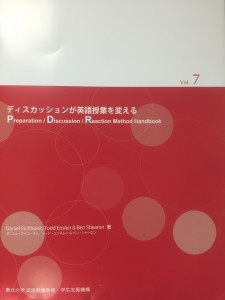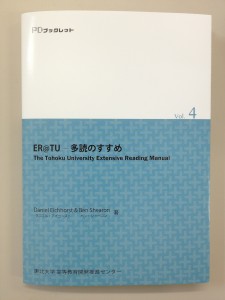The PDR Method Handbook
Our new book is here
Last year we finally got around to writing the teaching manual for the Preparation Discussion Reaction method and the printed copies arrived last week. Like the ER@TU Handbook, the PDR Method Handbook is fully bilingual and available for free from Tohoku University (this one is A4 size though!).
The PDR method is a teaching approach based on small-group discussion that allows students to improve their language skills while also talking about issues or concepts. It is currently being used in two universities in Sendai to teaching English, but we believe it could be applied in a variety of teaching situations.
In particular, we believe the PDR method should be used to teach subjects other than English. In PDR classes, students participate actively, sharing ideas and building more robust understanding by discussing with their classmates.
Stay tuned for a guest post from the creator of the PDR method. You can order a complimentary copy here.
curriculum extensive reading materials school management teaching theory university
by sendaiben
2 comments
More copies of the ER@TU Manual
I am very pleased to announce that it is now possible to get more copies of the Tohoku University Extensive Reading Manual.
Just send an email to the Center for Professional Development and they should be able to send you a copy.
conference EFL eikaiwa language courses Language learning online resources presentations self-study technology TED theory
by sendaiben
2 comments
The future of online language learning and translation
This video is really interesting and a little scary. I’m going to have to start polishing my resume.
curriculum EFL eikaiwa ES evaluation expectations kids language courses Language learning school management teaching testing theory university
by sendaiben
2 comments
English teachers aren’t really teachers, are they?
This is something I have been thinking about for a while now.
I was just drafting this post when I saw this link by Steve ‘the Linguist’ Kaufmann (NB: I started writing this post three months ago).
I’m not sure that we EFL teachers are actually teachers.
After all, we are in charge of helping learners become proficient in a language. I see this as a skill to be practiced rather than a set of knowledge to be taught. I have always compared language learning to sports, and described what learners should be doing in terms of practice and training. The sports analogy seems to work very well:
1. some people are naturally better at sports/languages than others
2. anyone can get better at sports /languages through practice
3. formally studying sports/languages is of limited use on its own, although it can help if done in conjunction with practice
4. being good at one sport/language will often help you with another one
5. if you want to get better at a sport/language, you should aim to do meaningful practice every day
6. training equipment will help you improve at a sport/language, but is no substitute for practice
7. drills can be helpful, but you also need to practice under realistic conditions if you want to get better at a sport/language
You can probably make similar analogies to playing a musical instrument, or producing art.
The point is, if we are coaches rather than teachers, don’t we need to re-examine our teaching situation?
Are formal classes, exams, class assignments, and grades appropriate ways to help our students master the skill of English language use (as opposed to the academic equivalent knowledge), or are they actually counter-productive?
Now, most of us are restrained by our work situations: we can’t abolish classes or grades, but perhaps there is some way we can change our classes to make them more practical. I’ll be thinking about that in the new academic year, starting in April here in Japan.
curriculum EFL expectations kids school management teaching theory
by sendaiben
leave a comment
An interview with Ken Robinson
A great interview with Ken Robinson.


